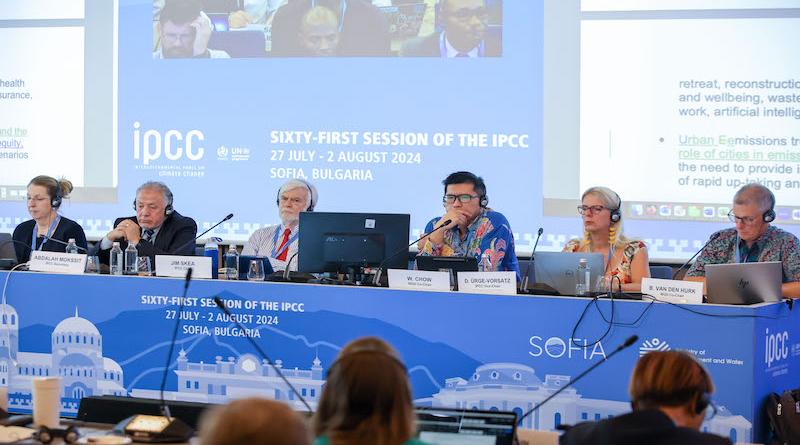The IPCC must produce its flagship report in time for the next UN global stocktake

A plenary meeting at the 61st session of the Intergovernmental Panel on Climate Change (IPCC) in Sofia, Bulgaria. Photo: IISD/ENB | Anastasia Rodopoulou
Dr Youba Sokona is an energy and sustainable development expert from Mali and was a vice chair of the IPCC’s sixth assessment cycle.
The Intergovernmental Panel on Climate Change (IPCC) seventh Assessment Report can and must be ready in time for the second Global Stocktake (GST).
The IPCC report plays a pivotal role in assessing climate change science and informing government decisions, especially in the context of multilateral negotiations.
The GST is a key element of the Paris Agreement, designed to evaluate the world’s progress towards long-term climate goals. It must be conducted “in the light of equity and the best available science,” underscoring the importance of IPCC assessments as a primary input for the GST.
As an IPCC author from the Global South, I believe that ensuring the IPCC cycle aligns with GST timelines is crucial for maintaining the integrity of international climate cooperation.
Efforts to enhance the inclusion of developing country voices should be prioritized over inordinate delays, which could risk the irrelevance of the IPCC report for the second Global Stocktake – taking place in 2028.
Concerns over accelerating process
A delayed production at the three IPCC working groups—which craft three reports covering the physical science of climate change, impacts and adaptation, and mitigation— is being justified under three main arguments.
First, those in favour of delaying the report claim that expediting the process could risk a lack of representation of underrepresented communities. A delay may impact the inclusion of voices from the Global South and non-English speakers, reducing the diversity of perspectives essential for a comprehensive assessment.
Another argument is that the topics covered in the report could also be reduced in range. Ensuring a broad array of topics is vital for addressing the multifaceted nature of climate change and providing a holistic understanding.
Finally, delays would risk spreading out key messages from the different IPCC working groups. Timely integration of insights from the different working groups is crucial for a cohesive and comprehensive assessment.
Measures for inclusion
The IPCC’s role is to provide credible scientific assessments to the UNFCCC process and national decision-makers. Time constraints may lead to some compromises, but it is better to minimize these than to forego IPCC input entirely. The IPCC must ensure its assessments are available in time for the second GST to maintain its relevance and impact on global climate policy-making.
On the inclusion of underrepresented communities, ensuring representation is more about deliberate efforts than merely the time available. Creating networks for southern scholars, facilitating special issues in academic journals, and convening regional meetings can enhance representation.
Focused attention on these efforts in the next IPCC cycle is more effective than strictly adhering to traditional timelines. My experience as an IPCC author from the Global South indicates that inclusion results from proactive initiatives rather than extended timelines.
Successive IPCC cycles have increasingly included literature from developing regions and better represented perspectives from the Global South. For instance, AR6 highlighted issues of equity, impacts on vulnerable communities, and development pathways relevant to developing countries.
Without IPCC input, the GST may lack essential Southern perspectives. The direction of travel within the IPCC has been towards greater concern for under-represented regions, countries, and research communities. Removing IPCC input risks losing an important source of southern perspectives.
No risk of losing quality
Accelerating the cycle by a few months does not significantly compromise the report’s robustness. Past assessments have been completed within five to six years, and with urgency, drafting and expert reviews can be slightly expedited.
Reviews by governments remain crucial to the science-policy interface. The effective time required for a single working group report is approximately four years from the call for experts for the scoping meeting. Given the urgency of the climate crisis, it is feasible to shorten the drafting and review process by a few months without compromising the quality.
Concerns about topic range and integration can be mitigated through proper planning of publications and coordinated efforts across working groups. Modifying the assessment report process to be more flexible is preferable to rendering the IPCC policy irrelevant. Appropriate planning can achieve a significant degree of integration, even if not perfect.
Designing the IPCC cycle in ways that prevent input to the GST risks undercutting an essential element of international cooperation—providing scientific assessment to political decision-makers.
Concerns about the under-representation of developing country voices are legitimate but can be better addressed by redoubling efforts to enhance these voices in the IPCC, rather than through delay. Ensuring timely IPCC input to the second GST is essential for effective global action on climate change and for the voices of developing countries to be adequately represented.
This opinion piece is adapted from a letter written by Dr Sokona and 39 other IPCC authors from developing countries ahead of the IPCC’s plenary session in Sofia, Bulgaria





